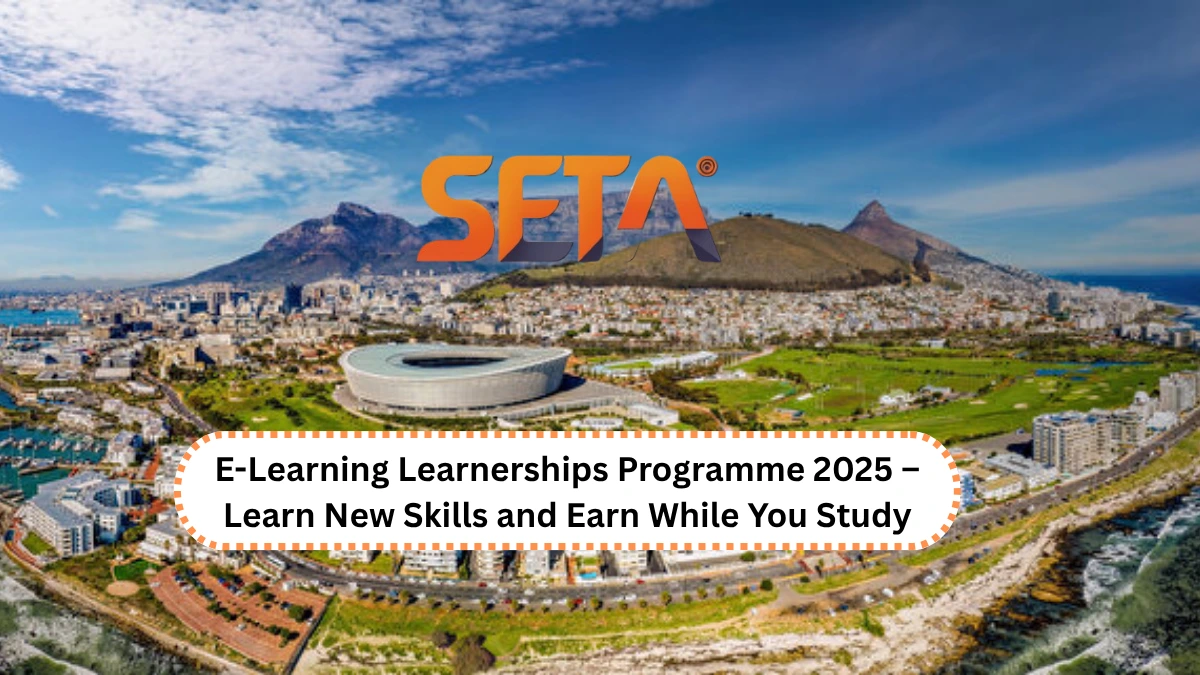The E-Learning Learnerships Programme 2025 is creating real opportunities for South Africans to upskill, gain work experience, and earn a recognized qualification—all without needing to attend a traditional classroom. Whether you’re fresh out of school, unemployed, or looking to shift into a new field, this online-based learnership model is an ideal path to employment.
What Is the E-Learning Learnerships Programme?
This programme blends accredited online learning with hands-on work experience. Learners go through structured modules online—at their own pace—while also completing practical projects, often in partnership with employers. Programmes are NQF-aligned and SETA-accredited, which means your certificate will be officially recognized in South Africa.
You’ll be learning via a mix of videos, assignments, downloadable material, live webinars, and digital assessments. In some cases, you’ll also get mentorship, career guidance, and even alumni access after completing the programme.
Why Choose an E-Learning Learnership?
Here’s what sets this apart from other learning options:
- Learn on Your Schedule – Study when it suits you, from wherever you are.
- Lower Costs – No commuting or relocation costs. Many of these programmes are free or subsidised.
- Job-Ready Training – You’ll get practical experience plus a certificate recognized by employers.
- Variety of Industries – Opportunities range from business and finance to marketing, IT, education, and healthcare.
- Real Career Impact – These programmes are designed to help you land a job, grow in your current role, or pivot into something new.
What You’ll Learn
Each learnership includes a combination of:
- Structured Online Lessons – With workbooks, quizzes, and short videos.
- Workplace Projects – Either virtual or in-person, depending on your field.
- Industry Support – Some programmes offer mentorship and webinars with professionals.
- Certification – At the end, you’ll receive an NQF-aligned certificate.
- Peer Support – You’ll have access to online communities, forums, and chats for support.
- Digital Recognition – Some providers even issue digital badges to share on your CV or online profile.
Who Can Apply?
The programme is generally open to:
- South African citizens aged 18 to 35
- Anyone with Grade 10, Grade 11, or a completed Matric
- Individuals who have internet access and basic digital skills
- Both newcomers and those with some industry experience
You don’t need work experience to get started, especially for entry-level tracks.
Application Steps
Applying is easy if you follow the right process:
- Do your research – Identify accredited providers and SETA-backed programmes.
- Get your documents ready – Make sure your ID, CV, academic records, and a short motivation letter are available.
- Submit your application – Usually through the training provider’s website.
- Wait for feedback – Some providers conduct interviews or online assessments.
- Orientation and onboarding – If accepted, you’ll be guided through the setup and enrolment process.
Tip: Always tailor your motivation letter and apply early.
Sample Learnership Providers
Here are a few institutions that offer quality e-learning learnerships:
- Milpark Education – Business-focused, with NQF level 5–7 courses delivered entirely online.
- Oxbridge Academy – Strong in admin, finance, and IT; support is provided through virtual forums.
- Regenesys – Offers career-focused training with both academic and workplace development.
- Eduvos – Online learning enhanced by new tech like AI and virtual reality tools.
- Various SETA-Accredited Providers – Look out for options like Tusanang, Skills Junction, Smart LMS, and others.
Each provider has its own course duration, entry requirements, and specialization areas.
Costs and Financial Support
Many of the programmes under SETA are offered for free or funded through grants. If you’re applying through a private provider, look out for payment plans, bursaries, and early application discounts.
Students are also encouraged to check their eligibility for financial aid through NSFAS or other public schemes.
Common Questions Answered
How long do learnerships last?
Most run between 6 to 12 months.
Are the certificates recognized?
Yes, if the programme is accredited through a SETA and aligned to the NQF.
Do I need a laptop?
A laptop or smartphone with internet access is often enough. Just make sure you’re comfortable using digital tools.
What happens after I finish?
Some learners get absorbed into full-time roles, while others use their qualification to explore new opportunities.
Why It Matters
The E-Learning Learnerships Programme isn’t just about getting a certificate. It’s a real chance to gain valuable, in-demand skills and practical experience—while still being able to work or manage family commitments. It supports South Africa’s broader goals of reducing youth unemployment, building an inclusive economy, and developing a more skilled workforce.
Whether you’re a young person looking for your first opportunity, someone stuck in a job that’s going nowhere, or an employer wanting to upskill staff, this programme delivers long-term value.





